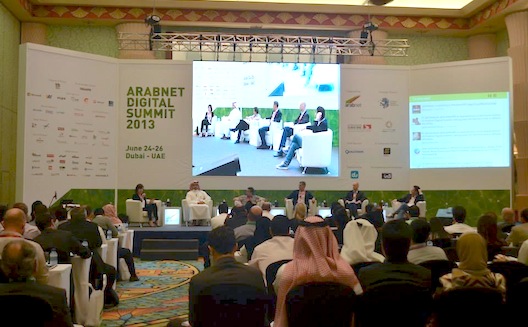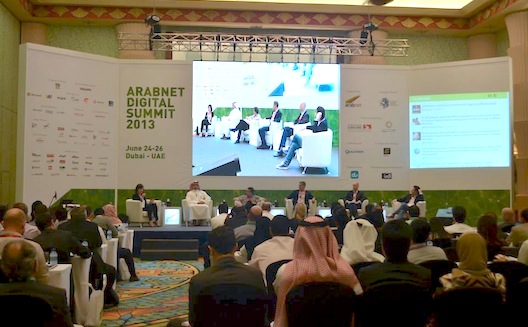6 unsettled debates from Arabnet's first Dubai summit


“How was the new Arabnet?” People have been asking since I
returned from Dubai last week.
Quickly: it was sleeker, with more industry heavyweights, more
international players, and less startups. It also was very much the
same Arabnet, with several regulars in attendance, the same
two-room panel structure, and the same snarky Twitterfall. In a
word, it simply had more gravitas.
Over the three day conference, attendees were treated to a
smorgasboard of content, perhaps even a bit too much; although, as
Alexander McNabb, the director at Spot On PR, pointed
out, the last panel on the last day was completely packed,
which is unusual for any conference.
Two highlights you can read/watch now:
- Narain Jashanmal’s
excellent ramble on the essence of shopping, human identity, 1984,
the integration of technology with humanity, and what makes
e-commerce human. (Slides
here; talking points
here).
- Benedict Evans’s presentation on how Mobile is Eating the World.
Low points: The panel on women’s content. It wasn’t McNabb’s fault at all- he politely fielded both droning answers from the panel and fiery questions from the crowd- but let's hope the next Arabnet has more women, and a wider range of us (Omar: I'd be happy to help moderate).
It would be impossible to summarize the entire event, but here are 6 questions it evoked:
1. Are investors shifting towards fewer, larger
investments?
On the first day, I moderated a panel on the state of venture
capital, which involved, ironically, a few entities that are not
VCs: Honeybee Tech
Ventures, which funds startups in-house, and N2V, which has stopped investing and is
focusing on its portfolio.
The news that N2V is no longer investing surprised several people,
I was later told. The holding company is clearly trying to focus on
increasing its value in preparation for an IPO, but all the same,
perhaps it's a large shift for an entity that once focused on
supporting idea stage startups, by running N2V Labs (and what has
N2V Labs produced?) and Startappz, a mobile-focused startup
accelerator.
Others were pivoting as well. Dany Farha of BECO admitted that, “If
you had asked us a year ago what our investment model was, we
didn’t have one,” while today, after investing in Duplays,
TravelerVIP, and Propertyfinder.ae, the firm is focusing on heftier
Series A investments. Focusing on a slightly later stage, with a
hands-on approach, might be one of the few ways to guarantee
startups make it, Salam Saadeh of Y+ Ventures, agreed in a chat
later.
STC Ventures is following
in a similar mold, with a few
$1 million+
investments lately, and Middle
East Venture Partners, which remains focused on early stage
startups, is creeping towards larger ticket sizes with a recent
$1 million investment in Cedar Books. It’s not the series A you
might find in Silicon Valley, but are bigger ticket sizes a growing
trend in the Arab world? Will the post-seed round cliff get steeper
for startups?
Wamda Capital, for one, remains focused on
early stage investment (I suppose whether that’s a shameless plug
or not depends upon your opinion of early stage investment).
2. Does equity crowdfunding have a shot in the Arab
world?
An announcement came through yesterday that virtual skills
marketplace Nabbesh had reached its goal in only 12 days on equity
crowdfunding platform Eureeca.
Are many of us skeptical of their immediate success? Yes. Was most
of the investment likely negotiated ahead of time? Alex Tohme and
Loulou Khazen of Nabbesh both admitted that several investors had
agreed ahead of time to invest, but insisted that several were a
surprise.
I’d still like to see what happens when we turn off that tap and
someone launches an organic campaign that simply solicits equity
crowdfunding from, well, the crowd.
It may have a chance, panelists concluded on the Crowdfunding
panel, moderated by Jason Best, Co-founder at Crowdfund Capital
Advisors. Christopher Tyrrell, a board member at the Australian Small Scale Offering
Board, which has been running crowdinvestment services in
Australia for 7 years, says that startups that receive equity
crowdfunding have a higher success rate than those funded by
friends and family. 86% of the businesses ASSOB has helped fund
over the past 7 years are still operating.
Darren Westlake of Crowdcube, the first U.K.-based equity crowdfunding
platform, agreed. “Of the 55 businesses that we've funded, not a
single one has gone bust,” he said. This is because of the rigorous
processes that Crowdcube puts startups through, and the three
stages they have to go through to secure funding," he said. “They
go through internal due diligence, due diligence with the crowd,
and then they have to get people to want to invest in them. You
have to be the best of the best.”
3. Can the major e-commerce companies
survive adolescence?
On the panel on “Big E-Commerce,” Ahmed Khatib of MarkaVIP, Ronaldo Mouchawar of
Souq.com, and Sherif Nassar of
Egyptian online retailer Nefsak
revealed their struggles with scaling.
If MarkaVIP does 60% of its own logistics, is it building a
logistics company? Arabnet founder Omar Christidis asked. “Is that
a sustainable model for you?”
It doesn’t really matter if it’s sustainable or not; it’s the only
way Marka has found to keep customers happy. “We didn’t see any
other way to provide convenience to the customer,” Khatib said.
Otherwise (I believe he said), their returns would be half.
Cracking the code of logistics in the region is still the only way
that many e-commerce companies expect to create value for potential
acquirers, Khatib pointed out: “Amazon isn't here because they
haven't figured out the logistics. Once we figure the math out,
you'll see Amazon coming and buying three to four companies.”
Maybe. The second biggest challenge at both MarkaVIP and Souq.com
will likely be maintaining internal consistency and a healthy
culture. Marka currently has around 330 or so employees, with only
8 engineers, while Souq has scaled from around 300 to 800 employees
in the past 8 months, after remaining relatively small for over 5
years.
Like any scaling company, they’ll both now be working hard to stay
efficient. There have been some rumors of difficulties with the
culture at Marka, but the company is working overtime to institute
corporate values and tie performance goals to values (more on this
soon). Souq is also rushing to put structures in place to keep its
teams aligned with central tenets; decentralizing management and
putting an HR department in place will be critical.
When it comes to marketing, Khatib admitted that Marka has scaled
back its once-ubiquitous online ads. These days, Google AdWords is
providing the flash sales site with the best conversion rates.
Mouchawar of Souq, on the other hand, cited video in Saudi Arabia
as the “best place for turning offline shoppers into online
shoppers."
Christidis also asked a question that I thought was worth
repeating: “What ever happened to that E-Commerce Task Force
that was launched last year?”
4. Will we see banks in the Arab world innovating anytime
soon?
On the second day, the always entertaining Alexander McNabb kicked
off a panel on banks by saying “Let's agree that banks in the Arab
world are rubbish!”
Pedro Cardoso, the Head of Multichannel & CRM at Emirates NBD, bravely joined to
answer directly for the banking sector, while Graham Thomas of
Radical and Kieran
O’Sullivan of HeathWallace both happily chatted
about the innovative products they had built for banks abroad.
Sadly, Cardoso kept promising upcoming innovations, but wasn’t
clear on exactly what those innovations were.
“Banks really need to catch up and the senior management is very
aware of that,” Cardsoso said. “You’ll be surprised with some of
the things that are coming,” he insisted, describing that ENBD had
recently introduced an interactive teller machine where you can use
your ID to make a deposit, open an account, or deposit multiple
checks and get one receipt- “This is an example of innovation in
the region.”
I may have missed something, but if innovation is depositing
multiple checks and getting one receipt… ruh-roh.
On his blog, however, McNabb
threw Cardoso a bone: “I came away from the session with the
feeling that people like Pedro are fighting against legacy systems
and legacy-minded management, while banks in other parts of the
world - leaner, meaner and generally more competitive - are
providing some really smart digital services.”
Joining the conversation at Arabnet, at least, is a
start.
5. Do your telecoms know more about you than your social
networks?
On the panel on Digital Strategies for Telecom Operators, telecoms
companies generally agreed that they wanted to partner with digital
agencies to create innovative products, while Ismaeel Makdissi of
Intigral baldly shilled the
agency’s digital products.
Paranoia struck the Twitterfall when Samer Geissah of du mentioned off-hand, “We have more insight
about our customers than Google or Facebook. If we can find the
right partner, who can take that information and make their lives
easier; then we have a winning combination.” Several tweeps began
posting about PRISM, setting off a discussion Geissah hardly meant
to invoke.
PK Gulati slammed telecoms for not innovating faster in the UAE. “A
mobile wallet has launched in Egypt, people in Afghanistan, Benin,
Togo, can pay their electricity bills online. Why can’t we?” he
cried from the back of the room.
In a word: regulations. “We have to comply with the rulings of
the Central Bank,” Khalifa Alforah of Etisalat admitted. “This will happen
once the central bank gives us the green light.”
The counterculture thread continued as Abdullah Hamed asked the
telecoms panelists pointedly about Google Loon; more about that
here.
6. What is premium content these days?
On the third day, I missed a fiery panel on The Future of Video.
Apparently, David Butorac, the CEO of OSN, kept insisting that premium content
remains within the purview of television alone, and that it would
never gravitate to free sites like YouTube. Abdulrahman Tarabzouni
of Google (and many in the audience) clearly disagreed.
“Premium content is elusive,” Tarabzouni said in a chat after the
panel. “For us it's all about the user experience. What matters
should be searchable, identifiable, and there when the user is
looking for it.”
This year, Google will be “socializing and channelizing” YouTube,
honing its recommendation algorithms to dramatically step up its
presence as a landing page.
Overall, I thought Arabnet did a good job of seeding some fun debates. What did you enjoy the most?


